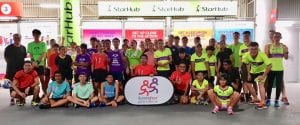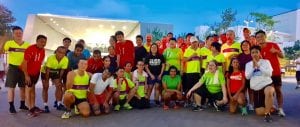In this unit, I have learned about the difference between IQ and EQ. I think that EQ and IQ are both equally important and that they can both be developed by self-awareness and practice.
Generally, I believe that I am quite an open person and I try to be aware of my and others’ emotions and feelings which is a measure of EQ. The scores indicated on the EQ tests that I completed suggested that I had a slightly above average EQ. However, I do not believe that it is accurate as emotional intelligence is very hard to put a number to.
I think that I have quite high emotional intelligence although it is still something I can improve by focusing on being more self-aware.
For my first FOA, I thought that I did quite well in exploring how language used to describe netball contributed to the issue of gender equality.
At the start of my presentation, I analysed three different texts to establish the discourse. I believe that I utilised these texts well to explore the initial purpose of netball; however, I think that I was simply repeating similar points by analysing three different texts. Instead, I could have analysed one in more depth and spent more time on other aspects of my presentation.
I think that my close analysis of specific words was quite thorough and I was able to draw important points from very short words and phrases. I feel that one of the other things I did well was identify the effect that text type had on the intention and receival of the text although I think I could have analysed context and audience purpose further. Additionally, I could have concentrated on using more terminology to show my understanding of literary techniques.
Another thing that I could have focused on is commenting on the overall style of the text before doing close analysis so that I can introduce my points before showing examples.
So far, I have taken part in 5 Running Hour sessions. During these sessions, everyone is paired up with an intellectually or physically challenged person to either walk, jog or run around the national stadium track or pedestrian path from the national stadium to Marina Barrage. Each time, I have been paired up with a different person, mostly those that have a form of autism.
This is a different experience for me as I have not previously done local service with people before, but mostly with animals. Therefore, this was an unfamiliar environment that I learned to adapt to and in doing so, I developed the social skills necessary to interact with intellectually or physically challenged people. I have also developed friendships with some of them and so I can feel more connected to locals in Singapore with various personal challenges. In the photos below which was taken during the sessions, guides (non-challenged) and those with disabilities are all posing together which shows that the ability to adapt to the new environment to connect within the group.




By talking to those that I was helping, I have also increased my understanding of their situations and how they are affected by their disabilities. For example, I now understand more about their education and how different schools in Singapore are specially adapted to helping the intellectually and physically challenged. I also recognise the ethical issues that they face when finding employment as most of their options are limited to retail and service jobs. This contributes to my understanding of global issues as well since this isn’t only the case in Singapore.
In terms of Running Hour itself, the positive effects of volunteering to help those with disabilities are clear. Not only does this service give them the opportunity to do exercise in a secure environment with people looking out for their safety, but it also gives them the chance to connect with other people who have disabilities and even people who don’t have disabilities. One thing to take into consideration is the mental health of the disabled, especially if topics are brought up during conversation that are particularly sensitive to them. However, I believe that the advantages to them outweigh the possible negative effects.
Throughout this volleyball season, I have developed my volleyball skills greatly through training and game play. These skills not only include volleyball techniques but also collaboration and communication skills within the team.
At the start of this season, my two main goals were to improve my setting technique to increase my accuracy during game play as well as my serving percentage as many of my serves did not land in.


During training, we practiced serving so that we could improve during game play. By taking advice from my coach, particularly about aiming very high above the net, I managed to improve my serving percentage. In the photos above, it can be seen that I am aiming quite high, showing that I have learned from my coach’s advice and applied it in game play.
Although I now have the correct technique, I believe that I can further advance my serving by putting in more power which is now one of my weaknesses that I intend to focus on.
From the video above, it is clear that I have improved on my setting technique and as a result, I am more confident with setting and my accuracy is quite high. Setting is now one of my strengths in volleyball although at the start of the year it was a possible challenge for me.
In the video, communication between the team is clearly evident. In volleyball, collaboration is extremely important. During games, there is a lot of communication to help the other players on the team know what to do. For example, shouting “free” lets the people at the net know to move backwards and be ready to take a ball that is coming over. As can be seen in the photo below, we also say “here” to help our teammates know where to pass the ball.

In addition, collaboration includes motivating team members. For example, we congratulate our teammates when they have a good serve, set, bump, block, tip or hit. This increases the moral of the team and improves play as well. These are therefore valuable contributions to the team.
Collaboration in volleyball isn’t only important during games but also in training. In my team, everybody has different strengths and weaknesses. Therefore, we can take advice from each other in order to improve our game play. For example, serving is one of my weaknesses; however, one of my teammates is a very good server. She was able to help me improve my technique by giving me tips. I was able to help one of my teammates as well by helping her to understand where she was meant to be positioned during game play.







